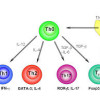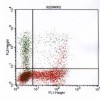Spontaneous cytokine production and its effect on induced production
Abstract
Cytokines regulate cellular immune activity and are produced by a variety of cells, especially lymphocytes, monocytes, and macrophages. Multiparameter flow cytometry is often used to examine cell-specific cytokine production after in vitro phorbol 12-myristate 13-acetate and ionomycin induction, with brefeldin A or other agents added to inhibit protein secretion.… Read more


